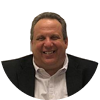 Written by: Mark Koulianos // Mar 31, 2022
Written by: Mark Koulianos // Mar 31, 2022
Last updated: Jan 17, 2023
Embedded within my position as director of University of South Florida’s Corporate Training and Professional Education is a broader, encompassing philosophy that advocates for ongoing learning. My vision is one where institutes of higher learning become the go-to hubs of a lifelong affinity education model. This becomes critical as fields of knowledge rapidly increase due to the exponential growth of technological capacity and its access.
As a result of this progress, the workforce faces a widening skills gap that needs to be narrowed. The late author Isaac Asimov said, “Education is not something you can finish.” And this is truer than ever. Formal education does not have to end with high school, military service, or vocational training. Even four-year and post-graduate degrees will likely require additional credentials or other noncredit certifications for career—and life—enhancement.
Lifelong, Affinity Learning at USF
At USF, the framework for such a nexus between career and affinity learning exists. The Florida Center for Instructional Technology (FCIT) is a division of USF’s Innovative Education and covers the K-12 demographic, as well as continuing education for teachers through after-school and summer programs. Among its offerings are programs to expose young students to the field of cybersecurity, a glaring need in the workforce. There are simply not enough qualified personnel to combat the proliferating threat of cybercrime.
The programs of Corporate Training and Professional Education are designed for workforce development. This upskilling and reskilling of today’s workforce supports individual growth and the development of a stronger team in company settings. Professionals can attain certification in human resources, project management, process improvement, leadership, and more. When a four-year degree is not feasible, courses such as paralegal training prepare students for a rewarding career in only a few months. These programs elevate and update skill sets, providing necessary versatility for the modern workplace.
USF’s Osher Lifelong Learning Institute (OLLI) serves the 50+ population of Florida’s west coast. OLLI’s array of programming includes opportunities for intellectual subjects, social connections, service, and outreach. OLLI caters to a population that is no longer career-minded but still seeking personal enrichment through educational offerings and activities. As the overwhelming majority of the Silent and Baby Boomer Generations transition to retirement, OLLI offerings keep seniors mentally, emotionally, and physically engaged.
Learning for Satisfaction, Not Just Success
It is important to state that these types of programming are not suggested as preferable to traditional paths of education. Rather, they supplement, enhance, and provide other routes in workplaces to address evolving needs with the most current applications.
The world is changing. In addition to the unbound proliferation of tech, the historic events of the last two years have brought glaring shifts to the global economy and workforce. Many employees, not yet having reached retirement age, have exited the workforce anyway — triggering “the great resignation.”
There are ways to increase knowledge and add skills throughout virtually every stage of the human life cycle — not just during the forty-year work span. Don’t miss out on the many rewarding ways to grow pre- and post-career. When we see each phase of life as a period of development — either academically, professionally, or personally — opportunities exist for greater everyday satisfaction.

